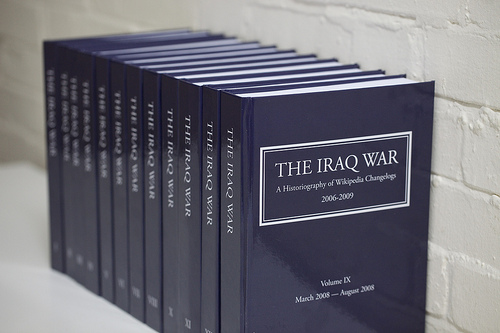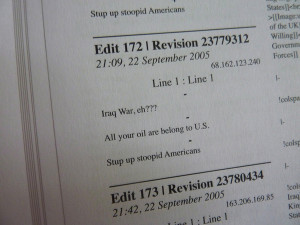
When talking about the construction of a Wikipedia page, we are talking about the action of collective creation. But it works not by simple mathematical sum of knowledge of the contributors. More than that, it is about the full development of the whole structure of this free encyclopedia, including issues such as rules of conduct, arguments and discussion.
Therefore, it involves the process of edition and their values for understand how the knowledge came to be and be understood.
To illustrate this point in a physical way, the writer and editor James Bridle published this month a set of books with every edit made to a single Wikipedia article. The entry elected was “The Iraq War”.
The result is twelve volumes, as a single old-style encyclopedia, with almost 7,000 pages that show about 12,000 changes made to the article since its inception in December 2004 until November 2009.
The collection exposes the differences of political standpoints and other relevant issues behind the article. It shows as well frequent moments of vandalism when someone, for example, erases everything and substitutes it for one single sentence.
With this work, Bridle defends the importance of the pages histories in Wikipedia as a relevant archive of historiography. A content that, he says, we can go through to understand history and that “there is no one true answer, there is no one true story”.
He believes that focus on that is a way to challenge absolutist narratives and allow everyone to see the process of history being gradually constructed. Also, he stresses that this kind of process always existed, but now is possible to store and comprehend how the facts that are treated are solidified.
“This is what culture actually looks like: a process of argument, of dissenting and accreting opinion, of gradual and not always correct codification. And for the first time in history, we’re building a system that, perhaps only for a brief time but certainly for the moment, is capable of recording every single one of those infinitely valuable pieces of information”.

The Bridle’s initiative shows that the collective process of creation presupposes the space for the clash of ideas, for suggestion for new links and for a joint review of texts.
The collective improvement of a controversial article, like the “Iraq War” entry, is the result of a process of discussion and negotiation that generates a collective vision of the subject matter.
Working on the same content, the group needs to deal with differences, check sources and refine concepts. Each discussion and argument evolving the edition of any article leads to the evolution of the texts and the behavior of Wikipedia, making it “alive” and linked with the today’s news.
Through collective creation the mainly concern is shifted from the protection of author’s name to the care with the information, to the result of the text made by the community.
It represents the experience of the community through the wiki. The progressive improvement of the content is a result of the cooperation between users and the movement of data.
The visualization of the process of the “Iraq War” entry confirms that maybe Wikipedia can be understood as the biggest table of discussion about the production and dissemination of knowledge and information nowadays.
Alexandre Guiote


